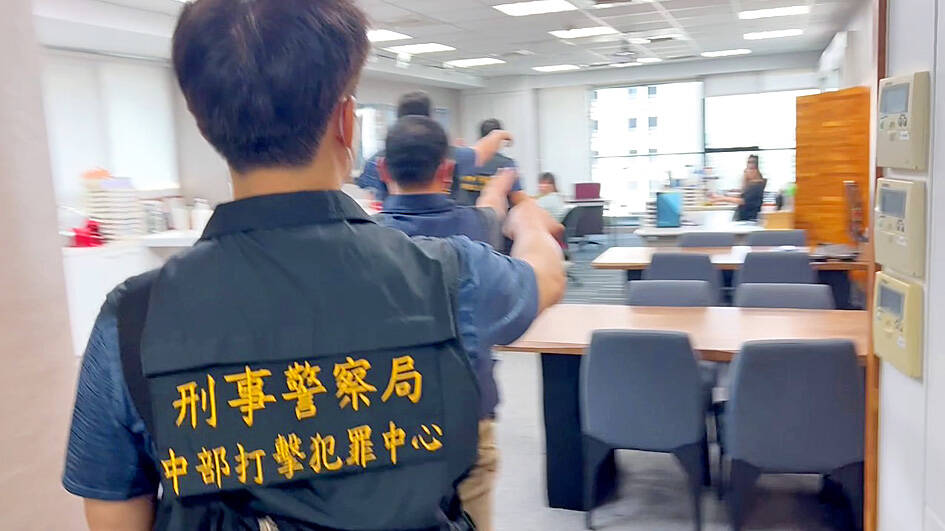Prosecutors yesterday pressed charges against the founder and executives of SeedIn Technology (旭新科技), alleging that it had conducted illegal financial schemes and contravened the Banking Act (銀行法).
Taiwan-based SeedIn operates a debt financing and crowdfunding platform with branches in Cambodia, Malaysia, the Philippines and Singapore.
Fifteen people associated with the firm, including its founder, a man surnamed Chen (陳), were listed as suspects, prosecutors said.

Photo: Chang Jui-chen, Taipei Times
The company is suspected to have defrauded investors since it was launched in 2014, prosecutors said.
Total investment since its founding is estimated to be NT$7.3 billion (US$228.36 million), they said.
Chen, 46, set up the person-to-business (P2B) investment platform, targeting small and medium-sized enterprises (SME), promising long-term investments for firms, especially those that regular banks do not cater to, said Huang Yu-feng (黃裕?), the Taichung prosecutor in charge of the investigation.
The company’s Web site says it is the largest P2B financial platform in Southeast Asia.
It provides alternative financing solutions, lowering the cost of credit and shortening the fund-processing period, the Web site says.
It promises support through its team members who have expertise in credit risk control, business analysis, corporate finance and information technology, it says.
Chen promised annual return rates of 7 to 12 percent, with monthly payments, Huang said.
“SeedIn Technology rolled out its mobile app for domestic and overseas investors,” Huang said. “The platform has attracted more than 10,000 people from Taiwan and Southeast Asia, matching them with SMEs.”
However, local authorities launched an investigation after complaints were lodged, he said.
Searches were conducted, while a property registered under Chen’s name, deposits in five company bank accounts, 15 luxury brand watches and other assets were confiscated, Huang said.
Business ledgers, transaction records, contracts, mobile phones and computers were also seized, he said.
SeedIn in a statement denied any wrongdoing.
The company and its executives have complied with all financial laws and regulations, and it had no motivation to conduct illegal business activities, the statement said.
“To this day, we have not infringed on the rights of any investors,” it said.
“The allegations were already investigated by New Taipei City prosecutors in 2019, which ended without indictment, so it is regrettable that the decision was made by Taichung prosecutors to press charges again,” it added.
“We expect the justice system will operate with fairness and without bias,” it added.
“SeedIn fully agrees with government initiatives to crack down on financial fraud and since the company was launched, we have operated on even more strict measures than those required by the fintech sector,” it said. “SeedIn’s self-monitoring ensures compliance with the law.”
“We believe in fairness and proper conduct of the justice system, and will provide evidence relating to the case to help clear the charges,” it said.

Three batches of banana sauce imported from the Philippines were intercepted at the border after they were found to contain the banned industrial dye Orange G, the Food and Drug Administration (FDA) said yesterday. From today through Sept. 2 next year, all seasoning sauces from the Philippines are to be subject to the FDA’s strictest border inspection, meaning 100 percent testing for illegal dyes before entry is allowed, it said in a statement. Orange G is an industrial coloring agent that is not permitted for food use in Taiwan or internationally, said Cheng Wei-chih (鄭維智), head of the FDA’s Northern Center for

The Chinese military has built landing bridge ships designed to expand its amphibious options for a potential assault on Taiwan, but their combat effectiveness is limited due to their high vulnerability, a defense expert said in an analysis published on Monday. Shen Ming-shih (沈明室), a research fellow at the Institute for National Defense and Security Research, said that the deployment of such vessels as part of the Chinese People’s Liberation Army (PLA) Navy’s East Sea Fleet signals a strong focus on Taiwan. However, the ships are highly vulnerable to precision strikes, which means they could be destroyed before they achieve their intended

LOOKING NORTH: The base would enhance the military’s awareness of activities in the Bashi Channel, which China Coast Guard ships have been frequenting, an expert said The Philippine Navy on Thursday last week inaugurated a forward operating base in the country’s northern most province of Batanes, which at 185km from Taiwan would be strategically important in a military conflict in the Taiwan Strait. The Philippine Daily Inquirer quoted Northern Luzon Command Commander Lieutenant General Fernyl Buca as saying that the base in Mahatao would bolster the country’s northern defenses and response capabilities. The base is also a response to the “irregular presence this month of armed” of China Coast Guard vessels frequenting the Bashi Channel in the Luzon Strait just south of Taiwan, the paper reported, citing a

About 4.2 million tourist arrivals were recorded in the first half of this year, a 10 percent increase from the same period last year, the Tourism Administration said yesterday. The growth continues to be consistent, with the fourth quarter of this year expected to be the peak in Taiwan, the agency said, adding that it plans to promote Taiwan overseas via partnerships and major events. From January to June, 9.14 million international departures were recorded from Taiwan, an 11 percent increase from the same period last year, with 3.3 million headed for Japan, 1.52 million for China and 832,962 to South Korea,